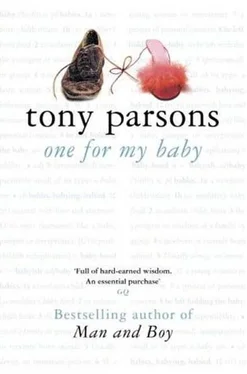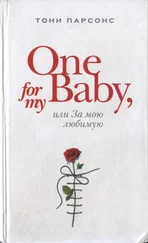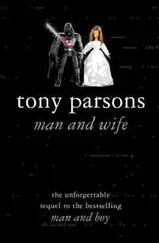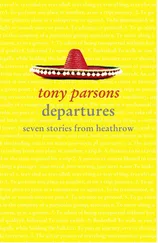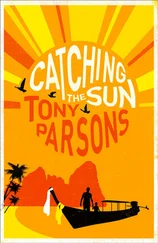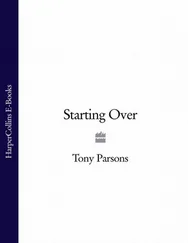She doesn’t let her kids cheek her when they are lining up for their burgers and fries. She doesn’t tolerate bad language in the school canteen. She doesn’t even let the little bastards scrap with each other (better they beat the hell out of each other rather than their poor underpaid teachers, if you ask me).
My mother has been known to put down her ladle-or whatever it is she dishes out the gruel with-stride into the playground and break up a fight. I have told her dozens of times that she is barking mad, that she could get seriously hurt. She doesn’t listen to me. She’s only five foot two, my mum, but she’s tough. And very stubborn.
She has worked at Nelson Mandela for almost twenty years, back in the days when it was still the Clement Attlee Grammar School. This means that there are men and women on the verge of middle age who remember her from their own years at the school. You might be walking down the street with my mother when some beer monster will suddenly come up to her and say, “Hello, Mrs. Budd, remember me?”
“Used to be one of my kids,” my mum will say.
I don’t understand how she can feel the way she does about these children. I guess it’s because she has a lot of love to give. Far more than my father and myself ever really needed from her.
When I was growing up, my mother had a series of miscarriages. It’s not something we talked about at the time. And it’s not something we talked about later. But I clearly remember being a bystander to my parents’ loss.
I don’t know how many times it happened. More than once. I can remember that there were these times in my childhood when there was a lot of talk about me having a little sister or brother. Not from my parents-I guess after the first miscarriage you are too wary to count on anything-but I remember aunts and female neighbors smiling down at me, talking about how soon there was going to be someone that I would have to look after.
I didn’t understand what they were talking about. I didn’t understand the syrupy smiles or the coy allusions. I couldn’t imagine anyone being so desperate that they needed me to look after them. I just didn’t get it.
But later, when I saw my mother weeping without any apparent reason on the stairs of the little house where I grew up, when I saw her heart breaking while my father tried to comfort her, then I started to get it. The cute talk from the overconfident neighbors had abruptly stopped. I wasn’t going to have a brother or sister. My parents were not going to have another child. Not this time. Not now. And, as it turned out, not ever.
I wondered where they were, my unborn little brothers and sisters. Were they in heaven? I tried my best to see them in my mind, my little brothers and sisters, but they were never real children to me, not like the other children at school or in the park, and not like the brothers and sisters of my friends.
These unborn siblings seemed more like an idea that someone had once had, an idea that had been thought about and then quietly put away. But I remember my mother weeping on the stairs, I remember watching her heart break, I remember her weeping as though those children were as real as me.
She loved me. She loved my father. She was very good at it. When we had hard times-when my dad was trying to write his book while still working full-time, when I lost Rose-my mum was our rock.
But no matter how much love she gave us, I always felt that she had more to give. I am not saying that’s why she worked as a dinner lady at Nelson Mandela High. But all that unused love is why my mum can look at all those unlovely children and feel a genuine affection for them.
“We’re giving him a birthday party,” she says, putting on her coat. “Don’t tell your nan. Or Lena. Or him.”
“I don’t know, Mum.”
“It will do him good to celebrate his birthday,” she says, and for just a second there I catch a glimpse of the woman who, at fifty-four years of age, still breaks up fights in the playground of Nelson Mandela High.
The work is not going well for my old man.
When the work was going well, the door to his basement study was shut but you could hear music blasting out of his stereo. It was always the old-school soul music he played, music that is full of profound melancholy and wild exuberance, music that was the sound of young America thirty years ago.
When the work went well, my dad played all the mating calls of his twenties-the Four Tops, Diana Ross and the Supremes, the Temptations, Smokey Robinson and the Miracles, Stevie Wonder-but now the work is going badly, or not going anywhere at all, there is only silence in his basement room.
Sometimes I see him sitting at his desk, staring at his computer, a pile of fan letters by his side. People are always writing to his publishers to say how much they loved Oranges for Christmas, how they laughed and cried, how it reminded them so much of their own family. These letters, passed on by his publishers, should make my father feel good but all this appreciation seems to weigh heavily upon him, seems to make it even more difficult for him to get started on his new book.
My father is rarely at home these days. In the mornings he goes to the gym, pumping his pecs and crunching his abs and toning his buttocks until the sweat blinds him. At night he has endless chores and treats-there are drinks, dinners, launches, awards ceremonies and his wise, witty appearances at the artsy end of radio and television. Those long afternoons are the big problem for him. He stares at his computer screen for a while, Smokey and Stevie and Diana silent inside their CD cases and boxed sets, and then he calls a cab and slips off to the West End.
This is how my father fills his afternoons. He goes around the bookstores of Covent Garden and Charing Cross Road and Oxford Street, where he signs many copies of Oranges for Christmas. This makes his book easier to sell, so the stores are always pleased to see him, even though he is turning up unannounced and they have other things to do. The young staff fetch him a pile of books and a cup of coffee and my father sets to work.
I saw him once in one of those bookstores where they sell records, magazines and designer coffee, one of those new kind of bookstores where books are just one of the things they sell. He didn’t see me and I didn’t want to approach him. It would have felt like an intrusion into some private grief.
He looked so lonely.
It is possible that my father does other things in the West End when he escapes from his work and his family and his home. But that’s how I see him, that’s how he is fixed in my mind at this moment-sitting all by himself in the corner of a crowded bookstore, a cup of caffe latte growing cold by his side, passing the long, lonesome hours by writing his own name over and over again.
On Friday night some of my students want me to go to the pub with them.
I try to wriggle out of it, telling them that I don’t really drink very much and I don’t really go to pubs, but they seem hurt and disappointed and incredulous.
An Englishman who doesn’t like pubs?
What’s wrong with this guy?
So I tell them that I’ll come along for just a quick one and they say that’s fine, a quick one is good, because most of them have to go to work tonight in whatever bar or burger joint or sushi conveyor belt restaurant pays their rent.
Their local is an Irish pub off Tottenham Court Road called the Eamon de Valera, and although it’s not yet six, the place is already full of young men and women from all around the world and even a few locals knocking back the dark glasses of Guinness, Murphy’s and Coca-Cola.
“Irish pub,” Zeng tells me. “Very friendly atmosphere.”
We find an empty corner of the Eamon de Valera and pull two tables together. My students start to get their money out but I tell them that their teacher will buy them a drink. I get in a round of stout and Coke.
Читать дальше
